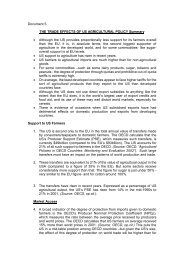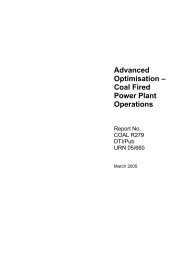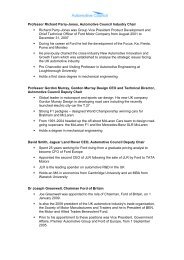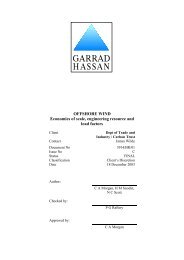Corporate Social Responsibility - A Government ... - DTI Home Page
Corporate Social Responsibility - A Government ... - DTI Home Page
Corporate Social Responsibility - A Government ... - DTI Home Page
Create successful ePaper yourself
Turn your PDF publications into a flip-book with our unique Google optimized e-Paper software.
than being approached as a separate subject in its own<br />
right with its own specialists and debates, we believe that<br />
a key strength of CSR is in providing a more holistic view<br />
of businesses and their activities. That perspective can help<br />
stimulate better policies, decision-making and business<br />
practices based on a broader understanding of business<br />
impacts beyond the purely financial. In other words CSR<br />
is as much as anything a way of thinking about and<br />
doing business. And that way of thinking needs to be<br />
mainstreamed across business operations and into<br />
company strategy. It is not just a task for the public<br />
relations department but needs to permeate across the<br />
company, in business development, marketing, human<br />
resources, finance and so on. We believe this is being<br />
reflected in the growing consensus that such integration<br />
is the only way for CSR to realise its full potential.<br />
But clearly the ways that individual companies take up the<br />
challenge of CSR must reflect their particular circumstances.<br />
The approach, challenges and opportunities would be very<br />
different as between a small software company operating<br />
exclusively in the UK and a multinational mining company.<br />
The distinction between practice and communication of<br />
CSR has also been a focus of discussion. To what extent<br />
should reporting and a public profile be taken to indicate<br />
a responsible business? The distinction is not necessarily<br />
clear cut – for a consumer facing business, communication<br />
is central to their CSR practice. Customers need<br />
information if they are to exercise choice – socially<br />
responsible investment (SRI) products, which continue to<br />
grow though still a small share of the current market,<br />
reflect this type of demand. Research has pointed to a<br />
public appetite for companies to communicate more about<br />
their CSR performance. But a lack of public profile cannot<br />
be taken to indicate a disregard for CSR. For many<br />
companies the focus is on “doing” CSR rather than<br />
reporting on it. The attention and potential for criticism<br />
that a raised profile can bring may make reporting a lower<br />
priority than substantive action. So there are choices to be<br />
made. Nevertheless, the drive for greater transparency as<br />
a means to improve accountability and trust has continued,<br />
as seen on the one hand in the further development of<br />
voluntary reporting guidelines and indices and, on the<br />
other, in calls for a regulatory approach.<br />
CSR has continued to develop well beyond its philanthropic<br />
and community roots with a growing focus on the business<br />
case. While there is strong evidence of the actual and<br />
potential benefits to individual companies and of correlations<br />
between responsible practice and national competitiveness,<br />
direct causal link on national competitiveness remain<br />
uncertain and difficult to track. Nonetheless, companies<br />
themselves have shown direct positive impacts on their<br />
business and <strong>Government</strong> recognises the potential for<br />
CSR to contribute to the five drivers of productivity<br />
identified by Michael Porter1 investment; innovation;<br />
skills; enterprise and competition.<br />
An increasing focus on the global reach of corporates<br />
and therefore the international dimension to CSR has<br />
sparked debate about the value and limits of CSR in<br />
dealing with many complex and sensitive issues associated<br />
with globalisation. But responsible business practice or<br />
sustainability is commonly acknowledged by all sides as<br />
vital to ensuring globalisation works for the poorest and as<br />
a means of bringing benefits to developing countries, for<br />
example, in capacity building through investment of capital,<br />
technology and skilled personnel. How business operates<br />
in the developing world and in conflict zones continues to<br />
come under scrutiny including the need for and value of a<br />
more regulatory approach.<br />
1 Professor Michael Porter ‘UK Competitiveness: moving to the next stage’ <strong>DTI</strong> Economics Paper No3<br />
7
















